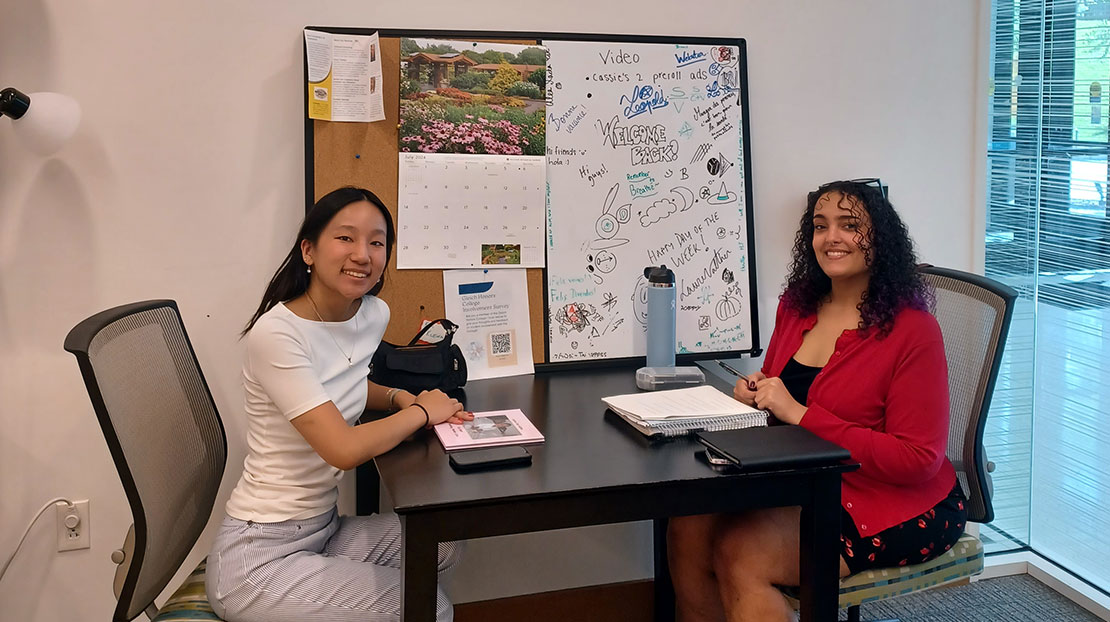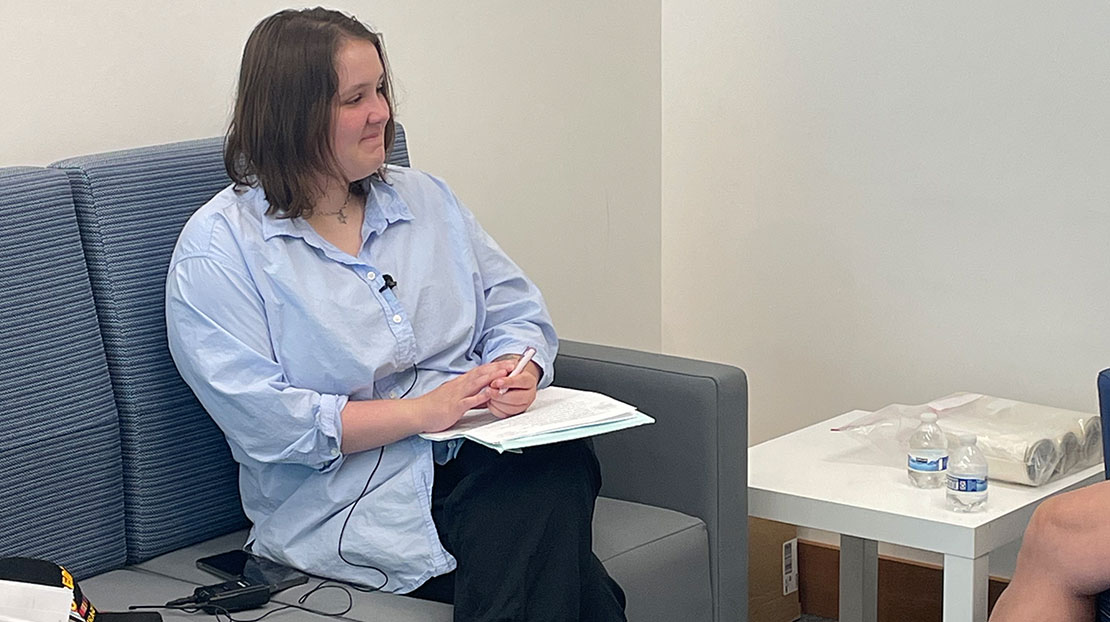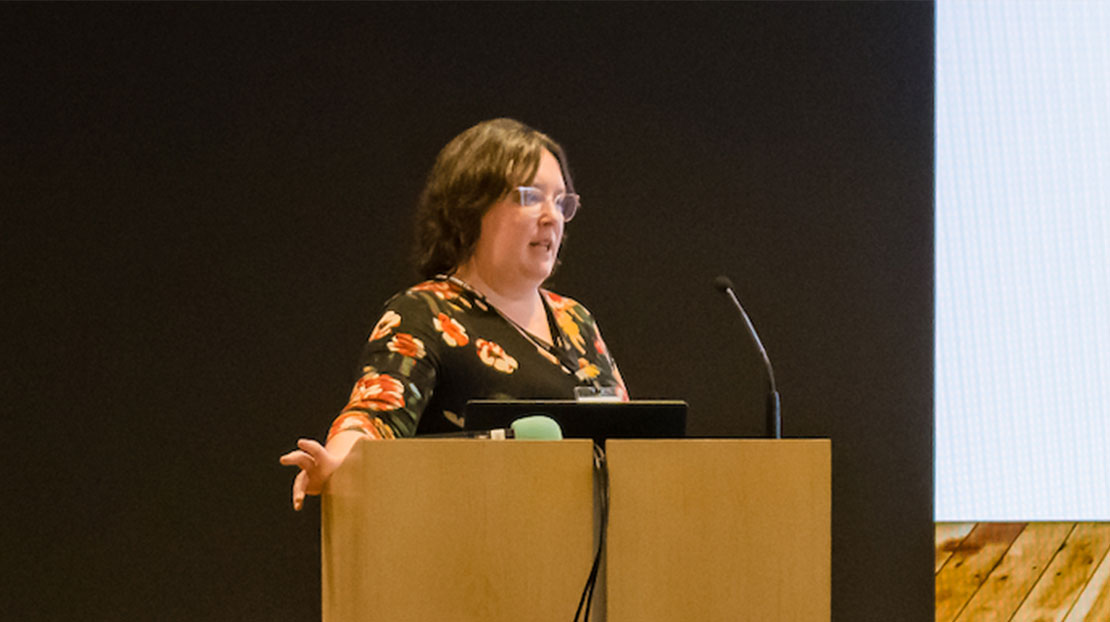Be a Changemaker in the World
Webster’s undergraduate degree in Anthropology and Sociology gives students the skills to examine and explain diverse social and cultural systems in order to address critical global social challenges in the world today. In the Bachelor of Arts in Anthropology and Sociology program, we teach skills in cultural competence, problem solving, interpersonal communication, and research and analysis that help students become effective leaders in business and marketing, technology, diversity and inclusion work, and health and medicine. At the core of our curriculum is social and global engagement with an emphasis on preparing students to become changemakers in their own communities.
Follow us on Instagram @glcswebster.

ANSO student Maya Zerazion preparing to interview Sociology minor Lauren Walther as part of the “Elevating Asian Voices Through Digital Storytelling” project led by anthropology professor Elsa Fan.

ANSO student Alex Koenig interviewing a community member about identity and belonging in St. Louis.

ANSO graduate Meghan O’Brien presenting her research at the Research Across Disciplines conference.
Choose Webster for a BA in Anthropology and Sociology
Work With Expert Faculty
Webster's Anthropology and Sociology faculty are experts in their fields across a wide range of topics including race and ethnicity, urban anthropology, humanitarian and development work, health and medicine, gender and sexuality, criminal and social justice, and social welfare. Students have the opportunity to supplement their coursework with one-on-one studies with faculty in their fields of expertise and work as research assistants on faculty projects.
Community Engagement
Students are encouraged to apply their classroom learning to building collaborations with the community. Opportunities are provided for students to work with community organizations that work on issues ranging from social and racial justice to cultural and historical preservation. These engagements allow students to expand their professional networks and gain valuable skills that prepare students whether they are seeking careers in business, social service, teaching, nonprofit organizational settings or pursuing post-graduate education.
Undergraduate Research
BA in Anthropology and Sociology students have the unique opportunity to conduct research under the guidance of a faculty mentor. By doing research, students will establish extensive relationships with the faculty, enrich their academic experience, enhance marketable career skills, and prepare themselves for competitive graduate and professional schools. Student research project examples include:
- Cultural appropriation in a globalized world: K-pop, hip hop and cultural identity.
- Preserving cultural meanings at Cahokia Mounds.
- The contemporary construction of girlhood: an analysis of gendered identity performance in online and offline spaces.
- The social and cultural evolution of death and dying in the United States.
- The (in)visibility of disability as a lived experience.
Acquire Real-World Learning and Real-World Perspective
Immerse yourself in a truly global learning experience by adding a Study Abroad experience to your collegiate experience. Take archaeology courses or earn an Archaeology minor at our Athens, Greece campus.
“All the professors want to get to know the students. They want to foster discussion so that the students can lead it and not just lecture to everyone.”
BA in Anthropology and BA in Philosophy, ’26
Bachelor of Arts in Anthropology and Sociology
Find out more about the overall curriculum, electives, learning outcomes and more for our Anthropology and Sociology degree.
View Course Sequence and Degree plan
Discover the Department of Global Languages, Cultures and Societies
What Can You Do With a Bachelor's in Anthropology and Sociology?
Most anthropologists and sociologists do not work in the academy. Many are in government, including international development, law and criminal justice, and natural and cultural resource management. They are also in the private sector, including large corporations such as Intel, Microsoft, Boeing and Walt Disney. And many are driven to solve local and global social problems and find employment in nonprofit and non-governmental organizations, including the World Health Organization, Amnesty International, United Nations and philanthropic foundations.
Alumni of the ANSO program have pursued careers in these industries:
- Banking and Finance
- Parks and Preservation (Cultural Heritage)
- Nonprofit and Social Justice Activism
- International Development
- Nursing
- Biomedical Researcher
- Teaching and Education
Salaries for Anthropology and Sociology Majors
The U.S. Bureau of Labor Statistics states the annual median salary for anthropologists and sociologists ranged from $64,910 per year to $101,690 per year in 2024. The BLS also states that salaries for related fields for 2024 are Archivists, Curators and Museum Workers at $57,100 per year, Social Workers at $61,330 per year, Urban and Regional Planners at $83,720 per year and Postsecondary Teachers at $83,980 per year. Some of the positions in this field may require additional education beyond the undergraduate level.
Get Started on Your Anthropology and Sociology Degree
Take the next step toward earning your bachelor’s in Anthropology and Sociology. We are here to help you get started.
Explore
Learn more about our academic programs and our main campus and locations.
Engage
Connect with our admissions counselors and academic advisors.
Apply
Apply to Webster and take the next steps for financial aid and scholarships.
Contact the Admissions Office to Find Out More
If you have more questions about the program, your application or other enrollment-related inquiries, contact our Admissions Office.
Call 314-246-7800 or 800-753-6765 or send an email to admit@webster.edu.

